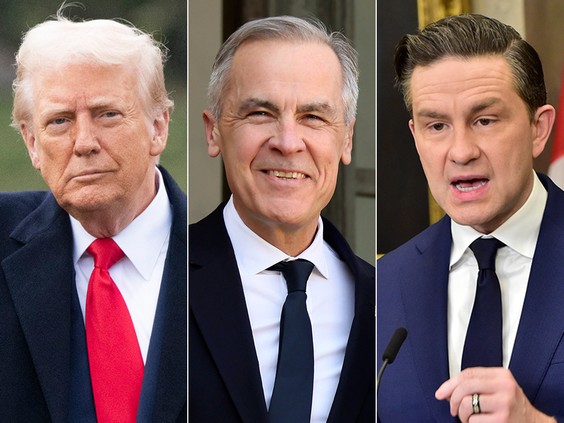Canada Versus U.S. President Donald Trump's Trade War
"He's a different guy and doesn't have a history with Trump. There was some baggage with Trudeau.""That's positive because Trump is very sensitive to personal interactions.""There's a fine line between going after Trump, and alienating him entirely."Daniel Beland, political-science professor, McGill University, Montreal"The difference between [Mark] Carney and Trudeau is Carney doesn't seek to make a point or to virtue-signal. When he goes to see Trump, it's about getting a deal.""The president's transactional, and Carney has a lot of experience in negotiating over the years."Lisa Raitt, former Conservative cabinet minister"Canada needs to continue having a proportionate response to any and all economic attacks from the U.S.""We will do that, in part, by keeping our tariffs on the Americans for as long as they have their own tariffs and until the Americans show us respect and make credible, reliable commitments to free and fair trade."Spokesperson for Carney
 |
Since
Donald Trump's re-election in the United States, he has repeatedly
spoken of Justin Trudeau, while still Prime Minister of Canada, as
'Governor' Trudeau. Strained relations between the two date back to Mr.
Trump's first term in office as President of the United States. They
since went from cold to downright frozen, with Mr. Trudeau referring in
public statements to 'Donald'. And cementing that hostility by calling
his tariffs "dumb". But that was a month ago, and PM Trudeau is no more,
to the great relief of most Canadians. In his place is the new leader
of the Liberal Party, elevated to the Prime Minister's Office at least
as long as it takes for an election to be called.
U.S.
President Donald Trump has made the political situation in Canada even
more tense, at a time when the Canadian economy is hobbling along due to
poor decision making and inaction in necessary exploitation spheres of
Canadian resources by the Liberal government, hobbling business and
trade with its overweening focus on the environment to the detriment of
the Canadian economy. Thanks to Mr. Trump's truculent, eruptive
behaviour it is not only Canada, but Mexico, China, and the European
Union, Japan and South Korea whose economic futures have been thrown a
fastball with the threat of steep American tariffs.
For
the present, PM Mark Carney governs Canada with the mind of a
technocrat and global economist. The country's goal, he has said, must
be to build the strongest economy in the Group of Seven. The fly in that
aspirational ointment is that while Trudeau's embrace of environment
issues was inconvenient to economic growth for Canada, Carney's will be
even more so, as a committed environmentalist whose past statements and
actions distinguished him as every bit as passionate on the issue as his
predecessor.
Mr.
Carney has stated he is in no hurry to visit Washington to meet with
the man who has said that Canada is not a viable country. But that it
would make a very good 51st state, in surrendering its sovereignty and
that it is his intention to destroy the Canadian economy in a bid to
convince Canadians that joining the United States is where their destiny
lies. Generally speaking, a great preponderance of the Canadian public
has no interest whatever in doing such a thing, and the resentment
engendered by these repetitive utterances is of magnitudes of disgust.
At the "appropriate time, under a position where there's respect for Canadian sovereignty",
stated Mr. Carney, he would be willing to undertake such a trip. On the
other hand, the recognition must be there, that no one can talk reason
to an unreasonable mind. In the meanwhile, Carney has undertaken trips
to France and Britain in a bid to shore up relations with the two
founding countries during the colonial days prior to confederation when
relations with the Indigenous populations of the country were fraught
with all the ills that accompany colonization.
Canadian
officials from the provincial to the federal governments had been
visiting Washington to speak with their counterparts over the issue of
tariff threats. Those threats have turned out to be predictive of the
man making them having no intention of not imposing them. Threatening
further that if counter-tariffs were to be imposed it would be his
intention to raise already-high tariffs even more. In the end the U.S.
levies have been matched tariff-for-tariff on incoming U.S. goods to
Canada, infuriating the U.S. president, that any other country would be
so bold as to thwart his intention of one-way tariffs.
Canada's
official opposition through Conservative Leader Pierre Poilievre is now
appealing to the voting public with his own agenda items; curbing
public spending, reducing foreign aid, cutting taxes and stimulating
business investments. The frank hope for the future is, once a general
election is called and the voters finally have the opportunity to make
their choice between a Liberal government that has spent a decade
beggaring the economy, mounting a colossal public debt, alienating the
country from East to West, transforming its culture and heritage and
burdening the country with an impossibly high and divisive immigration
rate that has failed its public health service and housing market,
Canada will have a new, commonsense Conservative government.
 |
| Prime Minister Mark Carney, while speaking in Iqaluit on Tuesday, announced that Canada will be working alongside Australia to build an early warning radar system in the Arctic. CBC |
Labels: Counter-Tariffs, Government of Canada, U.S. President Donald Trump, U.S. Tariff Impositions
0 Comments:
Post a Comment
<< Home